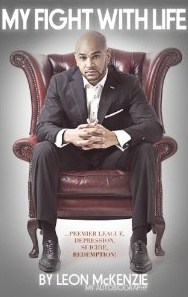Book Review: My Fight with Life by Leon McKenzie
 Robert Enke (2009), Dale Roberts (2010), Gary Speed (2011) – three men from the world of football who in recent years took their own lives. That list has nearly been added to by ex-players such as Dean Windass and the author of My Fight with Life, Leon McKenzie, who have both attempted suicide.
Robert Enke (2009), Dale Roberts (2010), Gary Speed (2011) – three men from the world of football who in recent years took their own lives. That list has nearly been added to by ex-players such as Dean Windass and the author of My Fight with Life, Leon McKenzie, who have both attempted suicide.
From a football perspective, the book details McKenzie’s journey from making his debut and scoring as a seventeen year old for Crystal Palace in 1995 through to his last playing spell at Corby Town in 2012. McKenzie spent five years at Selhurst Park playing in the Premier League in 1997/98 season with brief loan spells at Fulham and Peterborough United, before permanently signing for The Posh in 2000. McKenzie proved to be a hit with the fans and his form in his three years at Peterborough earned him a move to Norwich City in 2003, where he was part of the side that was promoted to the Premier League. In the 2004/05 season McKenzie proved he could play at the very top level in the English game, but The Canaries were relegated on the last day of the season after capitulating 6-0 at Fulham. However, as the 2005/06 season dawned, problems on and off the field were beginning to impact on McKenzie both physically and mentally. Injuries were starting to significantly cut into his playing time, whilst his marriage was on the ropes. Against this background, McKenzie looked to make a fresh start and signed for Coventry City in 2006. Here though his playing time was again hit by a series of injuries, but he did score his 100th professional goal against previous employers Ipswich Town on the opening day of the 2008/09 season. After three years McKenzie was again on the move this time, this time to Charlton Athletic, where with injuries seemingly bringing him to a standstill and the loneliness of living away from his family, he attempted suicide in 2009. His last professional club was Northampton Town in the 2010/11 season, before short stints at Kettering Town and Corby Town.
McKenzie is forthright in his views of the managers and coaches he worked under during his playing career. These range from then Crystal Palace boss Steve Coppell who McKenzie describes as “…a great bloke and real inspiration…” to Alan Smith (whilst at Crystal Palace) and Gary Johnson (whilst at Northampton) as “…by far the two worst managers…ever encountered…” The Professional Footballers Association doesn’t escape his criticism either, as he lambasts the organisation for its slowness in addressing the issue of depression in current and ex-players.
Away from the football, McKenzie is equally direct when talking about his life whether it be his famous boxing relatives, (dad, Clinton McKenzie and uncle, Duke), his marriage break-up, his stint in prison for motoring offences, his plans for the future as a professional boxer or working for Elite Welfare Management advising players about depression. There is much to be admired in that McKenzie is so open in talking about the depression he suffered and the attempted suicide, detailing and understanding how his injuries, coming to the end of a career and the impact of his childhood and family life, brought him to that fateful date in 2009.
However, the book suffers from a numbers of errors which proof-reading should have picked up on and from a lack of editing. This book would have been better served by a linear timeline rather than chapters which jump back and forth and therefore lack fluidity for the reader. Tighter editing would also have ensured that the repetition which occurs in the book was also avoided and the bizarre change in Chapter 14 where the narrative switches from first-person to the third-person.
Ultimately though, this is a brave story and one which can give hope to people (in whatever walk of life), that out of despair can come a positive future.